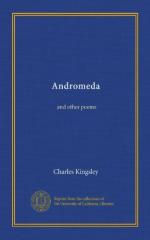Eversley, 1852.
ON THE DEATH OF A CERTAIN JOURNAL {282}
So die, thou child of stormy dawn,
Thou winter flower, forlorn of nurse;
Chilled early by the bigot’s curse,
The pedant’s frown, the worldling’s yawn.
Fair death, to fall in teeming June,
When every seed which drops to earth
Takes root, and wins a second birth
From steaming shower and gleaming moon.
Fall warm, fall fast, thou mellow rain;
Thou rain of God, make fat the land;
That roots which parch in burning sand
May bud to flower and fruit again.
To grace, perchance, a fairer morn
In mightier lands beyond the sea,
While honour falls to such as we
From hearts of heroes yet unborn,
Who in the light of fuller day,
Of purer science, holier laws,
Bless us, faint heralds of their cause,
Dim beacons of their glorious way.
Failure? While tide-floods rise and boil
Round cape and isle, in port and cove,
Resistless, star-led from above:
What though our tiny wave recoil?
Eversley, 1852.
DOWN TO THE MOTHERS
Linger no more, my beloved, by abbey and cell and
cathedral;
Mourn not for holy ones mourning of old them who knew
not the Father,
Weeping with fast and scourge, when the bridegroom
was taken from them.
Drop back awhile through the years, to the warm rich
youth of the nations,
Childlike in virtue and faith, though childlike in
passion and pleasure,
Childlike still, and still near to their God, while
the day-spring of Eden
Lingered in rose-red rays on the peaks of Ionian mountains.
Down to the mothers, as Faust went, I go, to the roots
of our manhood,
Mothers of us in our cradles; of us once more in our
glory.
New-born, body and soul, in the great pure world which
shall be
In the renewing of all things, when man shall return
to his Eden
Conquering evil, and death, and shame, and the slander
of conscience—
Free in the sunshine of Godhead—and fearlessly
smile on his Father.
Down to the mothers I go—yet with thee
still!—be with me, thou purest!
Lead me, thy hand in my hand; and the dayspring of
God go before us.
Eversley, 1852.
TO MISS MITFORD: AUTHORESS OF ‘OUR VILLAGE’
The single eye, the daughter of the light;
Well pleased to recognise in lowliest shade
Some glimmer of its parent beam, and made
By daily draughts of brightness, inly bright.
The taste severe, yet graceful, trained aright
In classic depth and clearness, and repaid
By thanks and honour from the wise and staid—
By pleasant skill to blame, and yet delight,
And high communion with the eloquent throng
Of those who purified our speech and song—
All these are yours. The same examples lure,
You in each woodland, me on breezy moor—
With kindred aim the same sweet path along,
To knit in loving knowledge rich and poor.




